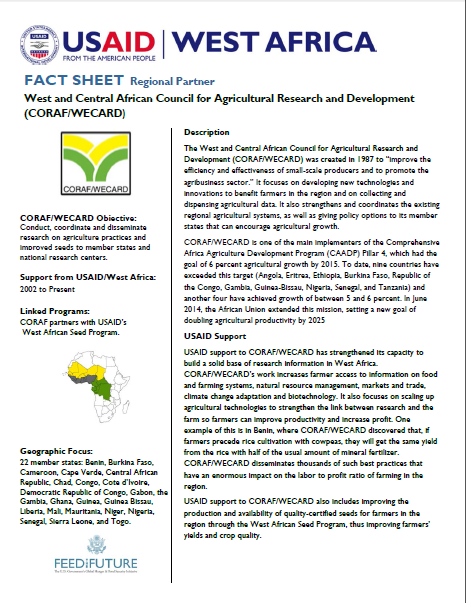CORAF/WECARD Objective:
Conduct, coordinate and disseminate research on agriculture practices and improved seeds to member states and national research centers.
Support from USAID/West Africa:
2002 to Present
Linked Programs:
CORAF partners with USAID’s
West African Seed Program.
Geographic Focus:
22 member states: Benin, Burkina Faso, Cameroon, Cape Verde, Central African Republic, Chad, Congo, Cote d’Ivoire, Democratic Republic of Congo, Gabon, the Gambia, Ghana, Guinea, Guinea Bissau, Liberia, Mali, Mauritania, Niger, Nigeria, Senegal, Sierra Leone, and Togo.
Description
The West and Central African Council for Agricultural Research and Development (CORAF/WECARD) was created in 1987 to “improve the efficiency and effectiveness of small-scale producers and to promote the agribusiness sector.” It focuses on developing new technologies and innovations to benefit farmers in the region and on collecting and dispensing agricultural data. It also strengthens and coordinates the existing regional agricultural systems, as well as giving policy options to its member states that can encourage agricultural growth.
CORAF/WECARD is one of the main implementers of the Comprehensive Africa Agriculture Development Program (CAADP) Pillar 4, which had the goal of 6 percent agricultural growth by 2015. To date, nine countries have exceeded this target (Angola, Eritrea, Ethiopia, Burkina Faso, Republic of the Congo, Gambia, Guinea-Bissau, Nigeria, Senegal, and Tanzania) and another four have achieved growth of between 5 and 6 percent. In June 2014, the African Union extended this mission, setting a new goal of doubling agricultural productivity by 2025
USAID Support
USAID support to CORAF/WECARD has strengthened its capacity to build a solid base of research information in West Africa. CORAF/WECARD’s work increases farmer access to information on food and farming systems, natural resource management, markets and trade, climate change adaptation and biotechnology. It also focuses on scaling up agricultural technologies to strengthen the link between research and the farm so farmers can improve productivity and increase profit. One example of this is in Benin, where CORAF/WECARD discovered that, if farmers precede rice cultivation with cowpeas, they will get the same yield from the rice with half of the usual amount of mineral fertilizer. CORAF/WECARD disseminates thousands of such best practices that have an enormous impact on the labor to profit ratio of farming in the region.
USAID support to CORAF/WECARD also includes improving the production and availability of quality-certified seeds for farmers in the region through the West African Seed Program, thus improving farmers’ yields and crop quality.Activities Supported by USAID/West Africa in 2013
• Baseline studies on agricultural research and post-harvest research for five value chains including maize, rice, millet, sorghum and livestock.
• Trials on high-yielding varieties of rice, maize and sorghum resistant to major biotic and abiotic stresses.
• Tests to improve the market quality of targeted cereal and traditional meat processed products.
• Capacity building for producers and agro-processors.
Key CORAF/WECARD Technologies and How They are Being Scaled Up
1) Climate-smart crop varieties like submergence-tolerant rice, drought-tolerant sesame and maize, heat tolerant and high-yielding millet and sorghum. Scaling up methods include demonstration plots and engaging all value chain actors, from plant breeders to private sector partners, to encourage commercializing new varieties of seeds.
2) Integrated Soil Fertility Management includes crop and site-specific fertilizer recommendations, best practices to rehabilitate degraded land and preserve soil fertility, and urea deep-placement (UDP) of fertilizer to maximize efficiency. These best practices are dispersed through demonstrations of deep placement of fertilizer and training agro-dealers so they can educate customers on how to most efficiently use fertilizer
3) Post-Harvest Quality Management through improved storage containers and post-harvest practices to reduce aflatoxin levels, which in large amounts can cause fungus growth. Promotion of storage container use and demonstrations of small-scale grain harvest machinery (stripper, thresher, and winnower) are dramatically reducing waste.
CORAF/WECARD and the Presidential Feed the Future Initiative
Feed the Future is focused on creating sustainable improvements in agriculture by building the capacity of West African organizations that can take ownership of agricultural work in the region. CORAF/WECARD’s work targets every step in the value chains of staple crops and thus improves every aspect of West African small farmers’ livelihoods: better yields, more efficient and sustainable inputs, better access to markets and market data, and less wasteful processing. CORAF/WECARD’s strategy aligns with the mission of Feed the Future: holistic and long-term efforts to eliminate food insecurity in West Africa.








Comment
Make a general inquiry or suggest an improvement.